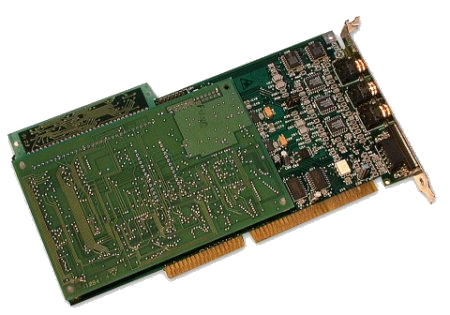Turtle Beach Monterey
Part of the MultiSound second generation, Monterey is the Tahiti card with the Rio daughterboard attached, bundled as an all-in-one purchase.
|
Released | 1994 |
| Bus | 16-bit ISA | |
| Chipset | ICS WaveFront 2115/2116 (on daughterboard) | |
| Audio Codec | Motorola 56001 | |
| Standards | General MIDI (via wavetable) | |
| Ports | Mono Mic In, Stereo Line Out, Stereo Speaker Out, MIDI port | |
| Wavetable | Wave Blaster header | |
| CD-ROM | None | |
| FCC ID# | - | |
| Price | At launch: $399 Jun 1994: $349 |
|
| See Also |
Since it uses the same Rio daugherboard as you could buy separately, the soundfonts on the Monterey are from VoiceCrystal (the same as those used by the TB Tropez+, TB Maui and Aztech WaveRider 32).
Rich Heimlich said this of the Monterey: "The newer version of the older Multisound. Winning same awards too. It's less expensive than the original and if it's not used for gaming the rating goes up to 9. Note that it uses a Rio as the music engine.". Digital quality scored 10 out of 10, while music quality scored 6.5 out of 10. What let it down was support and price (3 and 3.5 out of 10) with an overall score of 5.9 out of 10.
The "Hurricane architecture" that is touted on the box is an electrical design that supposedly circumvents the reliance on the motherboard's DMA, instead handling more on the card itself to relieve the burden on the main CPU (and in so doing vastly improving performance). This lends itself to audio processing of longer pieces rather than short sample playback that games would use.
Board Revisions
Competition
In the Media
The MultiSound Monterey samples in 8-bit or 16-bit stereo at rates of 11 kHz to 44 kHz. It includes a 32-voice ICS WaveFront synthesizer and numerous audio effects. Two stereo ports are provided for line input and one for line output. It has a combined MIDI and joystick port but no CD-ROM interface.
Sampling and editing are easily accomplished through the Wave SE application. Like the Sound Blaster, the Monterey does its best sampling at 16-bit resolution. At 44 kHz 16-bit resolution, the Monterey has better sound quality than the AWE32 and produces the most realistic audio quality imaginable. Many evaluators could not distinguish between the original CD and the 44-kHz 16-bit sample. When sampling at 44 kHz 8-bit, we encountered considerable hiss. The AWE32 and Monterey sound very similar at 11 kHz and 22 kHz, though at 11 kHz 8-bit, the Monterey was not as clear as the AWE32. The 22 kHz samples sound good enough for presentations. Stereo panning was accurate, with no audible cross talk.
Wave SE lets you apply effects such as gain adjust, muting, equalization, frequency analysis, cross fading, reverse, invert, DC offset (which can repair improperly recorded sounds), and time compression or expansion. Reverb can be added to the synthesizer through the Rio control panel. We rate high-fidelity audio excellent.
The MultiSound Monterey supports 48 MIDI channels, which gives a lot of flexibility for controlling external MIDI devices. Our listeners found the 32-voice WaveFront synthesizer to be realistic and useful for presentations. The synthesizer also has the added feature of allowing you to take any .WAV file and use it as a MIDI instrument.
The MultiSound Monterey supports Microsoft ADPCM compression. The Wave SE applications will import SoundStage .SF1, Creative Labs .VOC, SampleVision .SMP, and raw PCM 8- or 16-bit , mono or stereo. It will export Microsoft .WAV, SoundStage .SF1, Creative Labs .VOC, SampleVision .SMP, raw PCM data, Microsoft ADPCM .WAV, and AIFF formats. "
InfoWorld, July 1994
PC Magazine, January 1995
Setting it Up
I don't have any information on configuring the Monterey.
Downloads
Operation Manual Get in touch if you can provide this! |
Original Driver Disk
Get in touch if you can provide this! |
|
More Pictures
